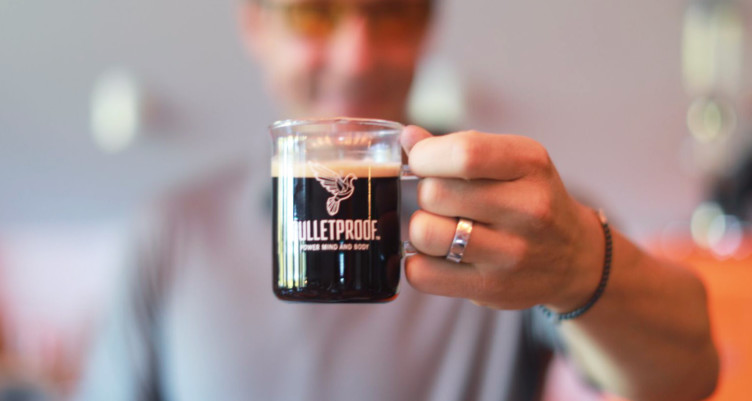OURA Ring Review: Why It’s My Favorite Sleep and Stress Tracker

- Trackers help you pinpoint what’s going on in your body throughout the day, so you can tweak your inputs in response to your your measures.
- The OURA ring gives you detailed information on your sleep states, heart rate, heart rate variability (stress level), body temperature, breathing rates, activity levels, and so much more.
- Taking control of your biology is one of the most empowering things you can do. How well you feel and perform varies from day to day, based on countless variables from your environment and your choices.
- If you want to go deeper with the information that you collect about your body, keep reading and see if the OURA will get your the measures you’re after.
Wearable technology like the OURA Ring helps you pinpoint what’s going on in your body throughout the day, so you can tweak your inputs in response to your your measures. Knowing when to adjust things like mealtimes, exercise, environment, and bedtime is vital to biohacking.
But with so many trackers out there, how do you know which one is worth your money and time? I’ve been testing wearable tech for years, before there was even a market for it. Below, my detailed OURA ring review will give you all the info you need to decide if its features make it the right tracker for you.
RELATED: While you’re tracking your inputs and output, download your 30 Day Upgrade that comes with a detailed food journal. It’s the easiest way to track how food makes you feel.
OURA ring features: an overview

As far as trackers go, the OURA ring won me over early. I have a drawer where rejected trackers go to die. I would wear a device for a week or two and decide the the data wasn’t all that meaningful. Or, I would stop wearing the bulky devices that bothered me all day. That’s not the case with the OURA.
The metrics are tremendously meaningful and I can use them to make positive changes. The OURA gives you detailed information on your sleep states, heart rate, heart rate variability (stress level), body temperature, breathing rates, activity levels, and so much more.
The battery lasts a week, it’s waterproof, and it looks great on anyone’s hand. It looks so much like basic jewelry that Prince Harry caused a stir when the media caught a glimpse of it and wondered if there was a significance to his sleek black ring. Sorry to disappoint, it’s just wearable tech.
It’s a game changer — which is why I detailed my experience with the OURA ring in my new book, Game Changers: What Leaders, Innovators, and Mavericks Do to Win at Life:. I’ve been such a fan that I recently joined OURA as an advisor. If you want to go deeper with the information that you collect about your body, keep reading and see if the OURA will get your the measures you’re after.
The OURA ring for sleep tracking
![]()
Almost every tracker on the market will track your sleep on some level. Some will log your bedtime and wake time, which is only part of the story of how well you slept. Others go into your sleep cycles.
The OURA ring provides the most comprehensive sleep data available. Metrics include:
- Bedtime
- Deep sleep
- REM sleep
- Resting heart rate
- Sleep efficiency
- Sleep score
- Sleep stages
- Total bedtime
- Total sleep time
- Wake time
Together, these tell you not just how long you slept, but how restorative your sleep was. Knowing how charged your batteries are gives you information on what tasks to take on the next day, and what to save for later.
For example, if I open the app and see that deep sleep was in the red, I’ll skip my workout the next day so that I don’t tax my body further. If early bedtimes cause a lot of wake-ups throughout the night, I’ll stay up a little later and see if that helps quiet my sleep.
And remember, you’re not a complete cyborg, so you can pay attention to how you feel and compare it to the data you’re getting.
RELATED: Hack Your Chronotype to Improve Sleep and Recovery By Wearing a Ring – Bulletproof Radio Episode #437
The OURA ring as a stress tracker
![]()
Stress highs and lows are part of life. It’s when you hang around in a stressed state that you get problems from it.
Sometimes you know you’re stressed. Emotional stress is easy to identify. Other stressors aren’t so obvious, like when you eat a food that doesn’t work with your biology. The fight-or-flight response your body goes through is the same, whether you notice it or not. If you increase your awareness of the stress that’s happening below the surface, you can choose whether or not to take on more stress — whether that’s an intense meeting or a serious workout — the next day.
One of the most reliable indicators of overall stress levels is heart rate variability (HRV) while you’re sleeping. HRV is a measure of the variation in the time between heart beats. You can read more about HRV here.
In general, higher HRV while you’re sleeping indicates that your body tolerates stress well, the things you do to manage stress are working, or that you don’t deal with a lot of stress. Low HRV throughout the night tells you that you’re stressed, or that you’re coming down with something, or that you’re reacting to a food or something else in your environment that isn’t right for your biology.
How to use that info? If my ring shows a low heart rate variability, that means I’m in a stressed state, and I’ll make it a point to get a meditation or yoga session in before I take on the day.
HRV tracking during sleep is one of the things that makes the OURA my favorite tracker. As a professional biohacker, I’m constantly experimenting with new supplements, new practices, and changing up what and when I eat. I have lots of ways that I measure how my body handles changes. In the morning, I check my HRV from the night before, and if it’s low, I go through the inputs of the day before to figure out what went wrong.
The OURA rings’ exercise tracking capabilities
![]()
Like most trackers, the OURA will give you an idea of how active you were and when. You can use that information to connect the dots in other areas of your life. If being active throughout the day improves your sleep metrics or raises your HRV, you’ll want to make it a point to get moving every day. If you exercised too late in the day and it screwed up your sleep, you’ll use that information to decide the latest time of day you can exercise.
If you’re looking specifically for a fitness tracker, the OURA isn’t the best fit. The OURA measures activity throughout the day, but it doesn’t get granular enough for most people who want to put their workouts under the microscope. It’s less of a feedback device, and more of a tracking device. Your OURA app will tell you that you spent some time on the treadmill, but it doesn’t tell you your heart rate at different points in the workout or give you the fictitious “calories burned” metric.
You can track your steps and distance and “calories burned,”, as long as you know that it’s useless filler data. These measurements don’t tell you a thing about how to do more of what works and what doesn’t.
Knowing your heart rate, heart rate variability, temperature, and sleep quality, however, will change your life — and those things you can get from the OURA ring. Head on over here to get yours and track your way to a better you.



